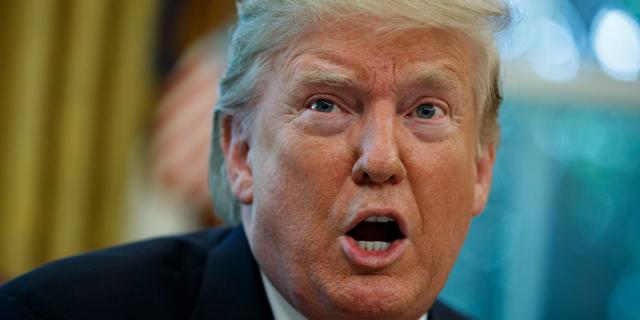Associated Press/Evan Vucci

- US officials were so alarmed by President Donald Trump's decision to reveal classified intelligence to Russian officials during an Oval Office meeting in 2017 that they extracted a top-secret source from Russia shortly after, CNN reported on Monday.
- Intelligence officials typically extract sources when they believe the person's life is in immediate danger.
- The information Trump shared with the Russians wasn't directly connected to the source, but CNN reported that its disclosure prompted officials to "renew earlier discussions" about the potential risk that the source would be exposed.
- The president has repeatedly been accused of mishandling classified information that could compromise the US's intelligence-gathering methods and put lives at risk.
- Visit Business Insider's homepage for more stories.
The US was forced to extract a top-secret source from Russia after President Donald Trump revealed classified information to two Russian officials in 2017, CNN reported on Monday.
A person directly involved with the discussions told the outlet the US was concerned that Trump and his administration routinely mishandled classified intelligence and that their actions could expose the covert source as a spy within the Russian government.
Trump stunned the national-security apparatus and intelligence community when it surfaced that in an Oval Office meeting in May 2017 he shared the information with Sergey Lavrov, Russia's foreign minister, and Sergey Kislyak, then Russia's ambassador to the US.
Trump's disclosure was not specifically about the Russian spy. But his disregard of strict intelligence-sharing rules to protect highly placed sources "prompted intelligence officials to renew earlier discussions about the potential risk" that the source in Russya would be exposed, CNN reported.
At the Oval Office meeting, which took place one day after Trump fired FBI Director James Comey, the president is said to have boasted to the Russians that firing "nut job" Comey had taken "great pressure" off him. Comey had been spearheading the FBI's investigation into Russian interference in the 2016 US election.

Trump then went on to share with Lavrov and Kislyak intelligence connected to the Islamic State in Syria. The information came from Israel, which had not given the US permission to share it with the Russians because it could have compromised an Israeli source in the region.
The report said that Mike Pompeo, the CIA director at the time, also told other senior Trump administration officials after the meeting that too much information was coming out regarding the US asset in Russia.
This is not the first time national-security veterans have expressed concerns that Trump's actions could reveal sensitive information about US intelligence-gathering processes and human sources working abroad.
Late last month, the president's tweet about US military information he received during a classified intelligence briefing earlier that day immediately set off alarm bells because it included a satellite photo of an Iranian launchpad that was of a much higher resolution and better quality than the commercial satellite images of the site that were publicly available.
It also contained markers indicating that it was taken by USA-224, one of the US's most secretive spy satellites.
Intelligence veterans said the president's tweet would be a gold mine for hostile foreign powers.
"One doesn't use intel for the purposes of taunting. The Russians and the Chinese will be very happy to study this," Robert Deitz, a former top lawyer at the CIA and the National Security Agency, told Insider.
Last year, Trump also made the unusual decision to authorize the declassification of a highly controversial memo about the origins of the Russia investigation by Devin Nunes, then the chairman of the House Intelligence Committee, for political purposes.
The memo and its release sparked a firestorm on Capitol Hill and within the intelligence community. Top intelligence officials met multiple times with senior White House staff to urge against releasing the document for fear that it could expose sources and methods.
The Justice Department and the FBI also took the extraordinary step of releasing statements cautioning against its release by the House Intelligence Committee without giving officials enough time to review it.
NOW WATCH: A year after Armenia's 250,000-person revolution, Prime Minister Nikol Pashinyan explains what comes next for the country
No comments:
Post a Comment
Post your lies Trumptards. Post the truth patriots.